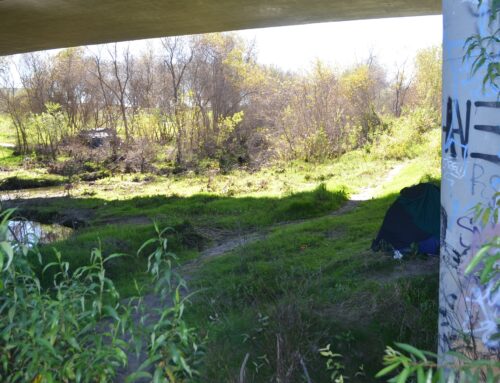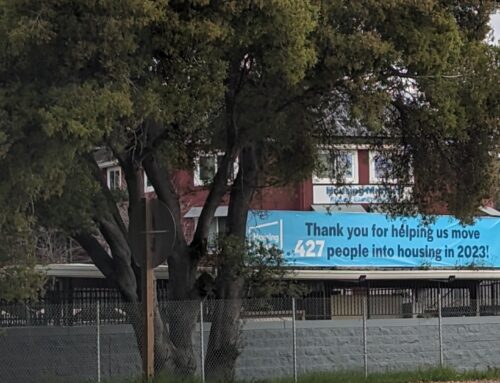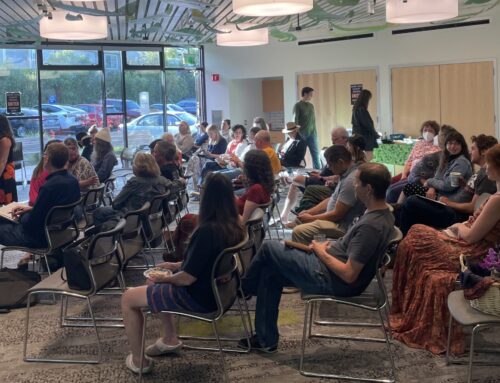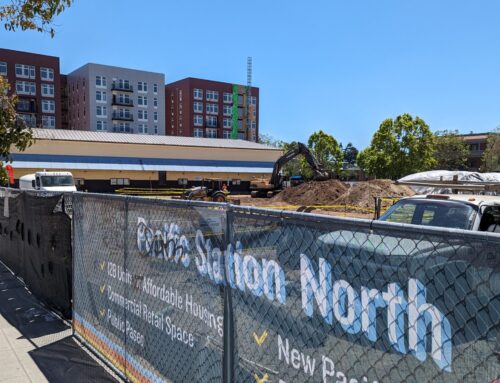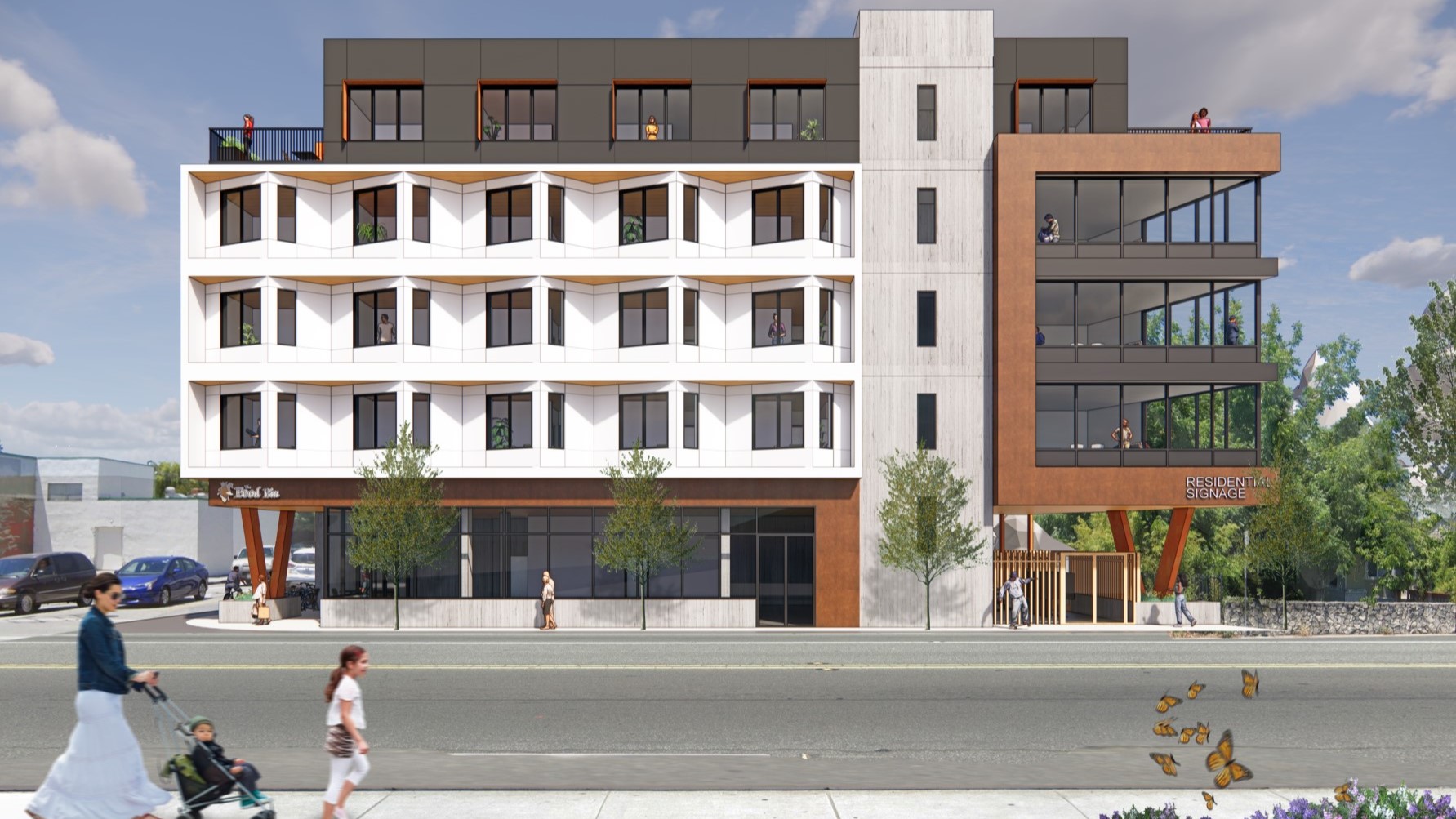
The Food Bin and Herb Room on Mission Street in Santa Cruz could be redeveloped into a 59-unit housing project on top of new versions of the stores. (Workbench)
SANTA CRUZ >> A five-story, 59-unit apartment proposal at the Food Bin and Herb Room was approved by the Santa Cruz Planning Commission Thursday night.
The decision is expected to be appealed to the Santa Cruz City Council because of some neighbors’ opposition. Construction at 1130 Mission St. could take 14-16 months, developers said. The Food Bin and Herb Room could operate as pop-ups on Mission Street during construction, the shop owners said.
After a packed four-hour meeting, the planning commission voted 6-1 to approve permits for design, demolition and other development aspects. The project’s ground floor would include a revamped Food Bin and Herb Room and takeout coffee bar. Four stories of single-room-occupancy apartments would stand above it.
“Let me just say it, this is a huge building, it’s big, it’s going to stick out, it’s gigantic. It’s going to shade people. It’s higher than most people in this town want, I think,” said Pete Kennedy, chair of the Santa Cruz Planning Commission. He explained his support for the project despite many neighbors who opposed aspects of the proposal.
“We do this thing where, ‘Oh, the state’s making us do this, we have no control over it.’ This is just political padding, you know? I want these units. I want more housing,” Kennedy said.
Kennedy voted in favor of the project with Vice Chair Julie Conway and Planning Commissioners Cyndi Dawson, Michael Polhamus, John McKelvey and Timerie Gordon. Commissioner Sean Maxwell voted against it.
State housing law
Throughout the meeting, commissioners and staff repeatedly mentioned that they could not defy the state’s mandated density bonus law. It entitles developers to build 50% more units than the local maximum if the project includes sufficient affordable units.
Santa Cruz city staff said state authorities were getting serious about penalizing local jurisdictions that do not comply with its housing mandates. Under SB330, the Housing Accountability Act, local governments could be fined more than $10,000 per housing unit illegally denied to a developer.
Santa Cruz city law requires developers of large housing projects to build 20% of the units as affordable based on state income limits. With the additional units allowed under the state’s density bonus law, Dawson said that 13% of the Food Bin proposal’s units would be affordable.
“The people passing these state housing laws are your elected state senate and assembly members,” Dawson said. “So as an engaged public, we need to keep our eye on the ball here. You’re hearing about these state laws that continue to pass in Sacramento, and I think that’s something to remember that it does trickle down.”
Developers of single-room occupancy projects have said that small units such as single-room occupancy are the most affordable because of their compact design. Santa Cruz city staff permitted 862 affordable homes from 2015 to April 2023, which exceeded the state’s Regional Housing Needs Allocation target. Housing demand continues to outpace supply.
Residents’ response
Neighbors and Santa Cruz residents packed Thursday night’s planning commission meeting. Public comment lasted more than one hour and included many nearby neighbors and members of UC Santa Cruz’s Student Housing Coalition.
Zennon Ulyate-Crow, a leader of UCSC’s Student Housing Coalition showed strong support for the project as proposed. He said the proposed size and location would make for desirable student housing. Additionally, he said he opposed requiring revisions to the project as it would slow the construction timeline and make it costlier to build.
“Every single time that we go and we say we need to do this (change) — and we do this, and we do this — it means the housing itself gets more expensive,” Ulyate-Crow said. “It means that we ended up with 9% of students at UCSC being homeless” as of 2020. He added that homelessness among non-students persists and rents remain high.
Doug Martin, whose Laurel Street house is adjacent to the proposed development, said the project would shade solar panels and cottages to the north.
“Please rethink the height of this building,” Martin said. “I don’t think we have any argument, but please, if you can, if you could look at it, come up and walk around the building and look down and imagine the impact that that building that size would have on our neighborhood,” he said.
Some other neighbors wanted more than the 12 parking spaces proposed in the 59-unit project. Because the proposal is within one-half mile of a mass transit stop, state law allows the project to exclude new parking.
Elizabeth Gordon, creative director at Workbench, said that the project is aimed at residents who don’t own cars. Gordon said it will be part of the tenant selection process.
“We’re aiming for a car-free community in this building,” Gordon said. We are prioritizing renting to residents without cars. And utilizing that state bill allows us to prioritize housing people over parking cars.”
Many neighbors doubted that the apartment managers could keep residents from having cars. Alex Cardenas, a Westside resident and business owner, said that even if the residents themselves don’t have cars, their friends and visitors likely would and impact the limited parking anyway.
“What about visitors and friends?” Cardenas asked.
Another resident, Ryan Meckel, said that if more parking were included, non-car owning residents would have to pay for parking they don’t use. It would increase the cost of living there.
“Adding parking to these projects (costs) tens to hundreds of thousands of dollars per space depending on how it’s built. And those are costs passed off to the residents. That means higher rent costs, higher building costs, and higher cost of living in Santa Cruz,” Meckel said.
Donna Haraway, a resident on Cleveland Avenue near the project, said she sympathized with concerns about parking availability, but ultimately she supported the project if coupled with better enforcement of permit street parking.
“Housing of this kind, three-, four- and five-story SROs and also other kinds of housing with commercial space on the bottoms, more of that kind of building along Mission Street in my view would make for a much more vibrant community if coupled with serious (parking) enforcement,” Haraway said.
She added that upgrades to crosswalks and bike lanes would help.
The Santa Cruz-based developer Workbench submitted the proposal to city planners in January 2023.
The project has not significantly changed. Food Bin owners Doug Wallace and Peggy Eulensen have said the stores would reopen under the housing project.
Read more:
- Food Bin owners explain housing proposal — April 21, 2023
- Food Bin housing proposal to be considered by Santa Cruz Planning Commission — Jan. 15, 2024
Questions or comments? Email [email protected]. Santa Cruz Local is supported by members, major donors, sponsors and grants for the general support of our newsroom. Our news judgments are made independently and not on the basis of donor support. Learn more about Santa Cruz Local and how we are funded.
Tyler Maldonado holds a degree in English from the University of California, Berkeley. He writes about housing, homelessness and the environment. He lives in Santa Cruz County.


